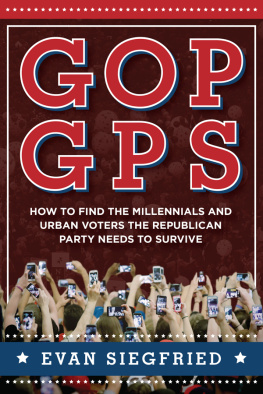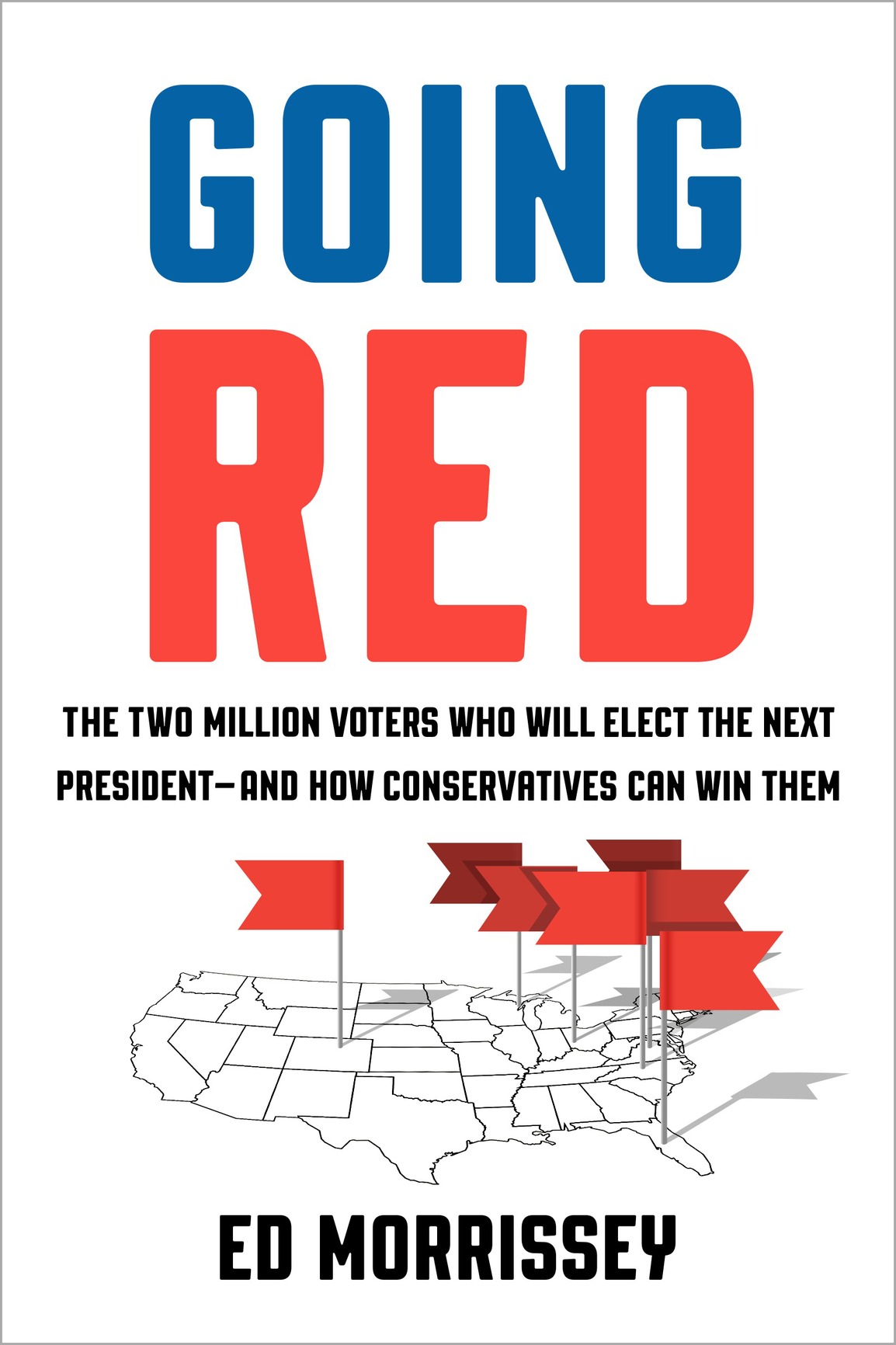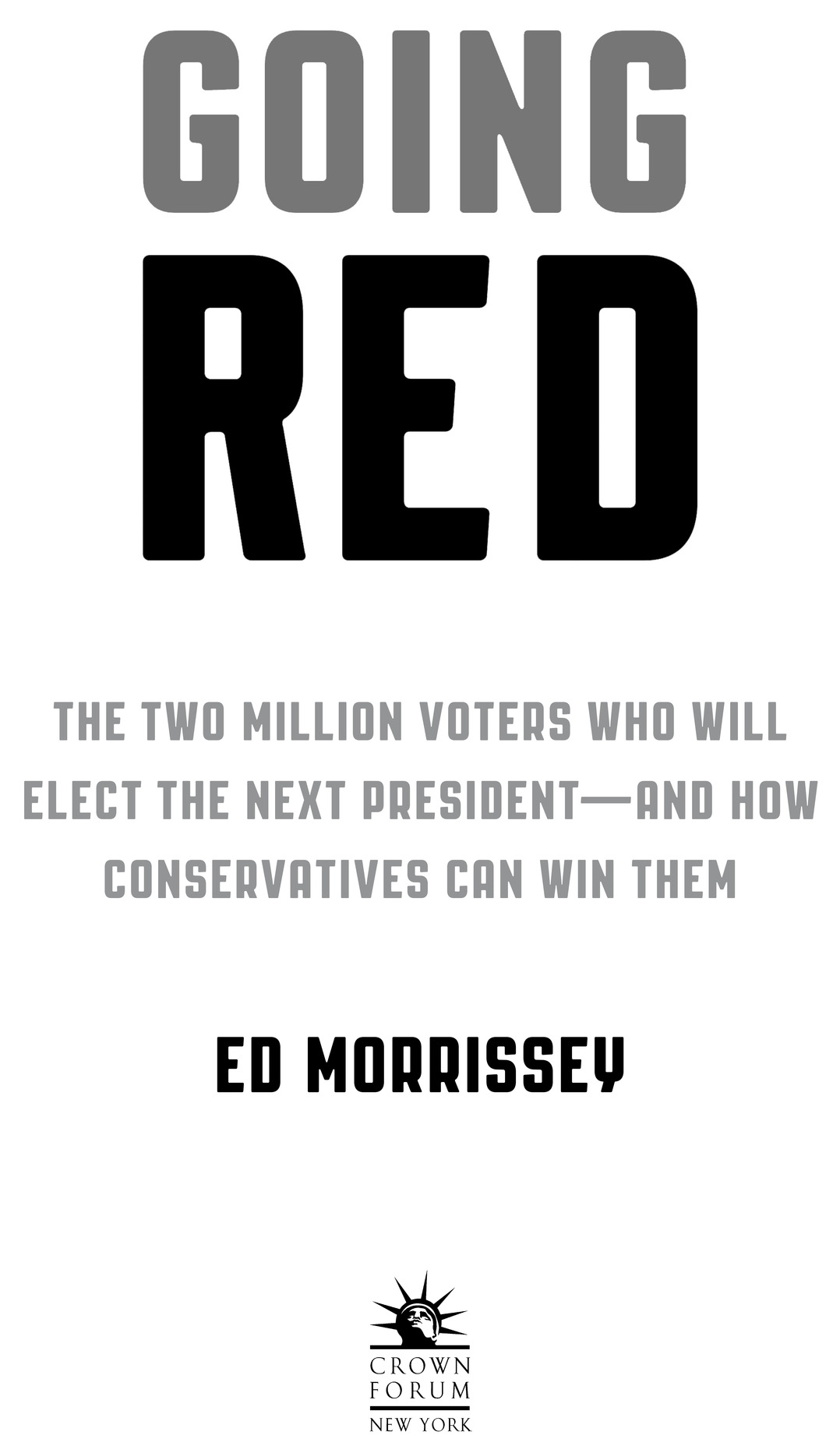All rights reserved.
Published in the United States by Crown Forum, an imprint of the Crown Publishing Group, a division of Penguin Random House LLC, New York.
CROWN FORUM with colophon is a registered trademark of Penguin Random House LLC.
Library of Congress Cataloging-in-Publication Data is available upon request.
More than three years ago, the hopes and delusions of the Republican Party collapsed in a shocking defeat that few on the Right saw coming. And I had a ringside seat at the disaster.
It was election day 2012 at the Southern California studios of Hugh Hewitts conservative talk radio show, and a palpable sense of optimism was buzzing in the air. At the desks outside the main studio, bloggers and analysts were hunched over their laptops, looking for the latest hint of the outcome and occasionally slipping in and out of the studio to share data. Inside the studio, I was with five on-air commentators, crowded around Hughs desk, narrating the election and preparing to celebrate victory. Early in the evening, we jostled elbows for time on the microphones, giving breathless updates and sunny predictions based on the reports of GOP sources who had told us to expect victory.
But when the polls began to close, the smiles on our faces disappeared. Early losses in states such as Michigan (where Mitt Romneys father once served as governor), New Hampshire, and Pennsylvania in the first fifty minutes of national returns soured the mood in the studio. The news that Romney won back North Carolina lifted our spirits, but within moments, it was reported that Iowa had pulled for Obama. And, at 8:17 p.m. Pacific time, we stared at one another across the desk as all of the major networks called Ohio for Obama. This was the surest sign of disaster; no Republican had ever won the presidency without Ohio.
With Ohio in Obamas column, CBS News felt confident enough to call the election: incumbent president Barack Obama would cruise to victory, they reported. And the news got worse from there. Despite believing that they had leads in swing states such as Florida and Virginia, the Romney campaign lost those and others as well. Not only had Obama won reelection, he had won all but two of the states he had pulled away from the GOP in 2008.
We sat in the studio for hours, dazed, trying to comprehend how everything had gone so wrong. None of us had seen this coming. How did Republicans miss what looked like a golden opportunity to prevail?
In the twelve months leading up to that moment, the election had looked to be anyones game. Romney limped out of a brutal primary season that saw more debates and less clarity of message than any previous cycle. GOP voters had expressed a desire for something other than the usual next-in-line progression of presidential nominees, but Romney had burned through his campaigns supply of cash to prevail over challenger Rick Santorum, who by that time hadnt held office in five years.
On the Democrats side of the aisle, the picture wasnt much rosier, thanks to a sluggish economy and a sense that trouble was brewing on the foreign policy front, with the collapse of Libya and the sacking of the American consulate in Benghazi. Dogged by low approval ratings, the president began avoiding the beat reporters at the White House, opting instead to focus attention on friendlier interviews
Republicans smelled blood in the water, believing that 2012 would give them an opportunity to unseat Obama. After losing in 2008, the Republican Party had picked up momentum in their 2010 midterm sweep, which seemed ready to carry over into an election-night victory. Their hopes surged even higher after the first presidential debate, in which Romney outclassed the incumbent, who seemed distracted and peevish.
National polling had supported this optimism, too. Two weeks ahead of the election, pollsters from CNN, Fox News, and Politico put the election at a tiebut outlets like the Associated Press, NPR, and Gallup were starting to give Romney the edge. Romney himself was so confident, in fact, that he bragged on Election Day that hed only written one speech to use later that night.
One wonders, then, how long it took for the Republican contender to start writing a different speech once the results started coming in. Team Romneys plan had relied on the belief that he could take back swing states like Virginia, Ohio, New Hampshire, Florida, Colorado, Wisconsin, and North Carolina from Obama. But with the exception of a narrow win for Romney in North Carolina, each of these states lined up in the Democrats column. In Ohio, the state that effectively decided the race, exit polls showed a turnout model that closely mirrored Obamas eight-point advantage from four years earlier.
Republicans had assumed that their surge in the 2010 midterms meant voters had rejected the Obama agenda, and Obama himself. They assumed that the turnout model of 2008, which favored Democrats by seven points, had been neutralized. And, most critical, they assumed that the conversation in national media directly reflected the concerns of voters on the ground, thanks to the proliferation of communications and news access in the Internet age.
Those assumptions turned out to be the key factor in Mitt Romneys loss. As the Republican National Committee (RNC) itself concluded, Obama ran a national campaign like a local election. Much of the analysis focused on how the president used social media and advanced technology to push his messagean effort Republicans tried to emulate in 2012but they missed how the Obama campaign used social media not just to message, but also to get to know voters in critical battlegrounds. Republicans ran a thirty-thousand-foot messaging campaign on national talking points, while the Obama campaign had ambassadors on the ground discussing how Obama would address their specific concerns.
Practically everyone has heard the old axiom All politics is local. Republicans forgot that key point in 2008 and 2012 and paid a steep price.
THE AUTOPSY
What went wrong? In December 2012, Republican Party chair Reince Priebus launched what the media termed an autopsy of the failed presidential campaign, from the perspective of the GOPs involvement. The official name for the report sounded somewhat more optimistic: the Growth and Opportunity Project. The one-hundred-page treatise on the failings of the GOP included this telling conclusion about the last several election cycles:
The GOP today is a tale of two parties. One of them, the gubernatorial wing, is growing and successful. The other, the federal wing, is increasingly marginalizing itself, and unless changes are made, it will be increasingly difficult for Republicans to win another presidential election in the near future.







